#cnt-fai
Explore tagged Tumblr posts
Text

74 notes
·
View notes
Text
"I immediately got involved in the ongoing socialization process. My group, the one that had occupied the barracks, immediately created a food depot, open to all, in the neighborhood where I lived. We assesed consumption needs and, subsequently, we intervened with certain workshops to intensify production. For example, I, who knew how to make bread, remember going, in the midst of a shooting, to help out at the neighborhood bakery. We were very imbued with the Kropotkinian idea - developed in The Conquest of Bread - according to which any revolution which proves incapable of feeding the people is lost in advance.
From there, we got our hands on all the grocery stores and warehouses in the neighborhood and we would go to the surrounding villages to exchange industrial products for foodstuffs. It was not a question of robbing the peasants, but of making them understand that we needed eggs and milk for the wounded in the hospitals. Knowing that the Catalan peasants are a little selfish, and being armed with our weapons, we could have proceeded authoritatively, but we would only have gained their antipathy. So we brought fabrics, canned goods and anything else they needed and exchanged them for chickens, potatoes and beans, which we loaded into our trucks. In the neighborhood, the products of the grocery stores, whose owners had been driven out, were centralized in a single place, where the people were invited to help themselves freely.
And how did it work?
Money having been abolished, the distribution of edibles was organized in the neighborhood on the basis of tickets, but they were only used for very specific items. For essential foodstuffs, all you had to do was go to the central grocery store and help yourself. We had, of course, a surveillance service responsible for spotting and investigating hoarders. I happened to go, one day, myself, to a lady who we were told had bread and bags of potatoes in quantity, which was true. There were controls. The market was free, open, but no abuse was tolerated.
A week after this system was put in place, an official from the regional committee of Catalonia visited us and, as he knew me, he began to explain to me how we should organize ourselves:
- It is essential, he told me, to create supply commissions to organize supplies...
I started laughing, and took him into the collective store.
- Look, that’s exactly what we did, without waiting for you...
In fact, the initiative returned to the people, without slogans or oders. They took the lead, without even the intervention of the CNT authorities. The workers had collectivized spontaneously, occupying the workshops of their own accord and putting them back into operation. The CNT did nothing other than confirm what had happened and which, for a lot of it, had been the work of their militants. The committees, too, were overwhelmed and waiting. This was, on my small scale, my experience in the field of collectivization."
-"Un entretien avec José Peirats" (1976)
8 notes
·
View notes
Text
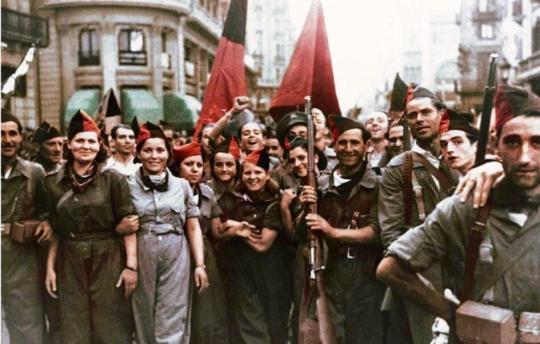
Pity the revolution that devours itself in order to obtain victory. Pity the revolution that waits for a final triumph to put its ideals into practice. In spite of all the difficulties and deceptions, the Spanish revolution had the good fortune to come to full fruition. The revolutionary work of the collectives will be an indelible mark in time and space. The rest will pass into history like a bad dream.
The Anarchists in the Spanish Revolution, José Peirats
{pictured: anarchists militants of the CNT-FAI in the Spanish Revolution, colourised photo}
6 notes
·
View notes
Text

Eugene goddamnit are you seriously fighting in the Spanish civil war right now?!?!
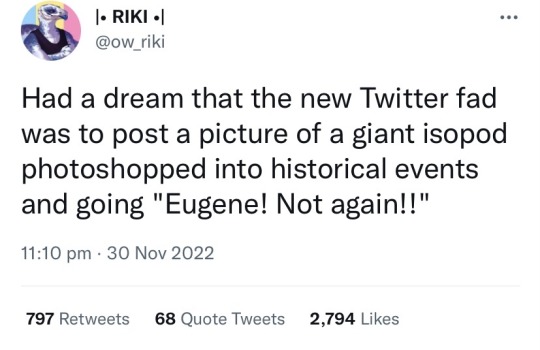
If this was originally posted on tumblr it would have become the big new trend within hours
[Image description: a tweet from Twitter user @ow_riki reading: ‘Had a dream that the new Twitter fad was to post a picture of a giant isopod photoshopped into historical events and going “Eugene! Not again!!”.’ It has 2,794 likes, 68 quote tweets and 797 retweets. End ID]
42K notes
·
View notes
Text

#cnt-fai#cntfai#161#1312#antifa#antifaschistische aktion#antifascist#class war#antiauthoritarian#antinazi#anarchism#anarchocommunism#anarchopunk#anarcho syndicalism#anarchofeminism#anarchist#anarchy#ausgov#politas#auspol#tasgov#taspol#australia#fuck neoliberals#neoliberal capitalism#anthony albanese#albanese government#eat the rich#eat the fucking rich#anti capitalism
1 note
·
View note
Text
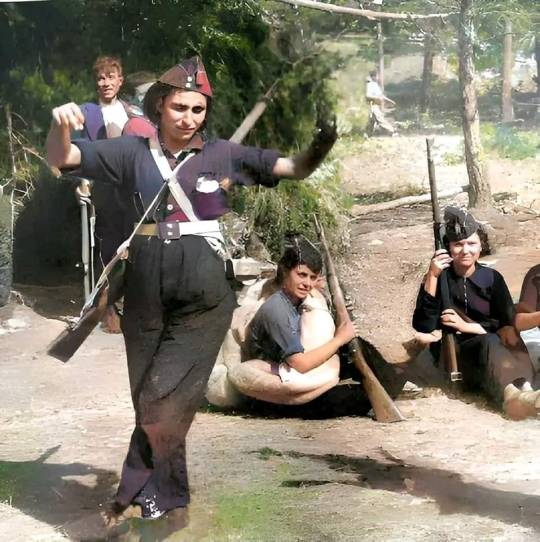
FAI-CNT militiawomen proving that they can in fact dance during their Revolution, Spain, 1936-1939.
#anarchism#anarcho syndicalism#anarcho socialism#spanish civil war#fai cnt#we can dance if we want to#antifascist#resistance
43 notes
·
View notes
Text
"Spurred by a leftist social consciousness, Horna left Paris in 1937 to cover the events of the Spanish Civil War. Her childhood friend, the Hungarian photojournalist Robert Capa, was also drawn to the conflict, documenting the struggle between Franco’s right-wing military forces and the Spanish Republicans in iconic images like Death of a Loyalist Militiaman, Córdoba front, Spain. Instead of the battlefront, Horna focused on the material conditions of women and children in war-torn Spain, and became involved with anarchist movements in the Catalan and Aragon regions. Horna’s Los Paraguas, mitin de la CNT (Umbrellas, Meeting of the CNT), Spanish Civil War, Barcelona shows a crowd from above. Sporting umbrellas, they gather in the street for a rally organized by the anarchist trade union, the Confederación Nacional del Trabajo (National Confederation of Labor), or CNT. Calling for a true worker’s revolution, the CNT opposed Franco’s dictatorship, while remaining skeptical of both its allies in the Republican government and the Stalin-backed Communist leaders in Catalan. Horna supported their efforts, designing a dynamic brochure commissioned by the Foreign Propaganda Office of the CNT and working as a photojournalist for a series of anarcho-syndicalist publications, including the feminist journal Mujeres Libres, the CNT’s cultural magazine Libre Studio, and the Valencia-based anarchist newspaper Umbral. In the offices of Umbral, she met her second husband, the sculptor José Horna."
MoMA

Los Paraguas. Mitin de la CNT (Umbrellas, Meeting of the CNT), Spanish Civil War. Barcelona 1937
Photo: Kati Horna
19 notes
·
View notes
Text

CNT-FAI propaganda poster designed by Aleix Hinsberger
7 notes
·
View notes
Text
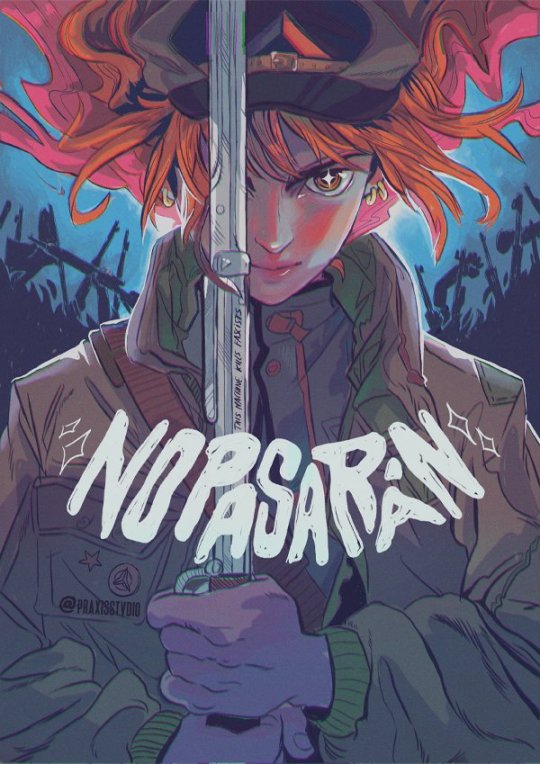
"Al fascismo no se le discute, se le destruye"
Primeiro debuxo de 2023❤️
#illustration#painting#digital art#art#communist#communism#socialist art#anarchist#No pasarán#Cnt fai#Antifascist
27 notes
·
View notes
Photo
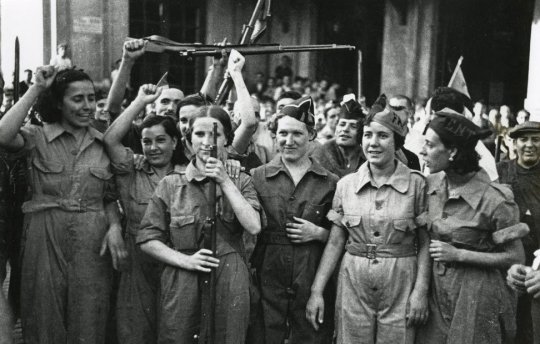
Mujeres milicianas anarquistas durante la Guerra Civil española. Ⓐ
16 notes
·
View notes
Text

Anarchist militiaman, Spanish civil war
4 notes
·
View notes
Text
"Paolo Gobetti: The line defended by Acracia was therefore in opposition to that adopted by the CNT-FAI?
José Peirats: Clearly... We were openly opposed to the participation of the CNT in the government because we were convinced that as soon as it was integrated into the state apparatus, our own organization would become our worst enemy.
(...)
The “higher committees” of what you could call the “official” CNT, tended, then, to be a monolithic leadership and they were very bothered by the fact that groups or sectors of the organization expressed disagreement with the imposed line.
We contested this line for the simple reason that no one had set it... No congress had decided to collaborate with the state apparatus, neither in town halls nor in the government, nor at fortiori had appointed ministers from its ranks. In other words, we stuck to the classic line of anarcho-syndicalism.
Furthermore, our experience led us to think that the CNT was making a big mistake by linking itself to institutional politics, it was lost in advance. By confronting them on their own ground, the CNT did not have the means to thwart the plans of politicians who were perfectly accustomed to moving in the upper echelons of the state apparatus. This is what happened: the politicians did with the CNT what they saw fit.
(...)
This was one of our major arguments, moreover: admitting that it was necessary to carry out institutional politics, we were not in a condition to take this step, and this because everything in us was opposed to it. For seventy years, our history has been based on a specific tactic and ideology. If, overnight, we changed it, we would find ourselves, first of all, in unknown and unfavorable territory, and in doing so, we would also contribute to slowing down the revolutionary process and supporting the counter-revolution. This was the thesis we defended.
Of course, it was unacceptable to the committees, who condemned us. Starting rom the events of May 1937, it was impossible for us to remain in charge of Acracia. We had to resign. Those who replaced us were people obeying to the instructions of the national committee of the CNT and the peninsular committee of the FAI, who also had the same perspective.
We thought, for our part, that we would have fulfilled our role as opponents by remaining outside the government, especially since we had a very big asset in our hands - production, the economy - and that we could have acted as a force of pressure. By placing ourselves on the adversary's ground, we had cut ourselves off from our roots and transformed ourselves into puppets of the State. However, this is the position that the CNT adopted throughout the war.
Paolo Gobetti: When you were forced to resign from leadership, did you receive support locally?
José Peirats: No, no. We were welcomed with sympathy, but we were let go without support, perhaps with regret, but with coldness. At the moment of truth, there was no debate, no one came to our defense. The only ones spoking were those who had agreed to compromise themselves in politics. In Lérida, in addition to the town hall and the police department, certain CNTists who exercised important functions weighed on the assemblies. Most of the activists therefore remained silent. For the sake of the circumstances and the war. This idea according to which everything had to be sacrificed to the war, widely spread by the committees and their representatives, assumed that the debate of ideas should be reduced to nothing.
(...)
To summarize, we could say that the militants were deeply opposed to the collaborationist line, but those who counted the most, among them, the most convinced, the most conscious, the most educated, had been the first to go to the front to fight the fascists. At the rear, the organization had artificially swelled with the arrival of recent affiliates, little ideologically trained, whose numbers weighed on the assemblies. In a way, the vital force of the organization had been supplanted by this silent majority on which the CNT authorities relied to impose their line. For the rest, it was enough for the committees to locate, here and there, oppositionists of various shades and to prevent them from acting."
-Paolo Gobetti, "Un entretien avec José Peirats" (1976)
5 notes
·
View notes
Text

4 notes
·
View notes
Text

1 note
·
View note
Text

Anarchist revolutionary Emma Goldman addressing a meeting of the CNT-FAI, Barcelona, 18 October 1936.
#Anarchist revolutionary Emma Goldman addressing a meeting of the CNT-FAI#Barcelona#18 October 1936.#emma goldman#class war#anti capitalism#antifascist#antiauthoritarian#ausgov#politas#auspol#tasgov#taspol#australia#fuck neoliberals#neoliberal capitalism#anthony albanese#albanese government
4 notes
·
View notes
Text
July 19, 1936: CNT and UGT called for a general strike against the fascist military coup. This marked the beginning of the Iberian revolution. ¡Viva La Anarquía! ¡Viva la Revolución!
0 notes